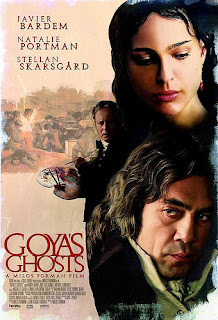Goya's Ghosts
 Milos Forman has a remarkably eclectic filmography, creating great films in a number of genres. One Flew Over the Cuckoo's Nest, Amadeus, Hair, Ragtime, The People vs. Larry Flynt, all tantalizing films, both visually interesting as well as intellectually stimulating. It is hard to believe Goya's Ghosts, which tackles a large subject, could be his work, for the resulting product is on such a small, tinny scale, and often plays like one of those bad docudramas on the History Channel.
Milos Forman has a remarkably eclectic filmography, creating great films in a number of genres. One Flew Over the Cuckoo's Nest, Amadeus, Hair, Ragtime, The People vs. Larry Flynt, all tantalizing films, both visually interesting as well as intellectually stimulating. It is hard to believe Goya's Ghosts, which tackles a large subject, could be his work, for the resulting product is on such a small, tinny scale, and often plays like one of those bad docudramas on the History Channel.I think the main problem is I don't know why this film was made. What, exactly, is Forman and his co-screenwriter Jean-Claude Carriere, trying to tell us? That the Spanish Inquisition was bad? That a great artist like Goya, who was at times very subversive, could also be a man who was very concerned about the bottom line? That power corrupts? The film tells us all those things, but it's certainly nothing new. The film doesn't really offer any insights into the human condition, or the nature of art. All it really did was get to me to spend some on Wikipedia looking up the historical particulars.
The story concerns Francisco de Goya, a painter to the royal court of Spain who also created disturbing, grotesque images depicting evil. The film begins in 1792, and his work is being examined by the Holy Office, a body of churchmen who have their thumb on the people. Goya has a defender, a Brother Lorenzo, played by Javier Bardem. Lorenzo is a slippery character, stating that Goya is only exposing evil, not creating it. But Lorenzo is no liberal. He takes the opportunity to ramp up the Inquisition, which had started to die down.
One of the first victims of this is Inez, who is a muse of Goya's and the daughter of a rich merchant. Because she turns her nose up at pork, she is suspected of being a Jew, and is "put to the question," a euphemism for torture. Goya attempts to get her released, but her father, in a very satisfying scene, turns the tables on Lorenzo, who then has to flee the country.
Flash forward 15 years, as the French invade Spain and imprison the inquisitors. Portman is released from prison, a shell of her former self, but claims that she had a daughter--fathered by Lorenzo. Goya, now deaf, but still a prominent painter, again tries to help her. He finds her daughter, also played by Portman wearing some ghastly dentures, but the lass is turning tricks. As the painter attempts to reunited mother and daughter, the shifting sands of power lead the principals on a rollercoaster ride from vanquishers to vanquished.
Though this may sound like the stuff of sweeping epics (or a film made from one of those fat historical novels), the result seems sketchy. I was particularly annoyed by the music, the kind of generic stuff from TV melodramas that injects itself into the action with no subtlety. I have no idea how accurate any of the history is, but people seem to run into each other in crowds without too much trouble.
Of the actors, Bardem is effectively reptilian as an opportunist, and Stellan Skarsgard is fine as Goya (who is really a supporting character). I'm a little concerned about Natalie Portman, though. She must have done this film right around V for Vendetta (Goya's Ghosts has been on the shelf for a while), which makes two films in which she is tortured back t0 back. She wears some pretty frightening makeup for when she is a prisoner, so I suppose this role appealed to her in an attempt to de-glam, but there isn't much of a character there.
The best part of the film may be the closing credits, when painting after painting of Goya's is shown. It's a reminder that one would be better served by attending an exhibition of Goya's work that seeing this well-intentioned but unsatisfying film.


Comments
Post a Comment